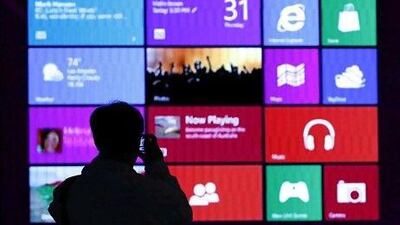Microsoft's new operating system, Windows 8, which has just been unveiled, is a hit with industry analysts.
"Windows 8 is designed to work across many form factors, from desktops and all-in-ones to ultrabooks and notebooks to hybrids and tablets … Windows 8 has many strengths. You can do everything with it that you can do on a PC," says Sarah Rotman Epps, a senior analyst at Forrester Research.
Tim Coulling, an analyst at the research company Canalys, says: "The killer app of Windows 8 for corporate users will be its ability to plug seamlessly into a Microsoft back-end. From an IT manager's perspective, Windows 8 will be easy to secure and manage."
"It is far faster and more secure than its predecessors," says Rob Enderle, the principal analyst at the Enderle Group.
Early users have so far been impressed with Windows 8's stylish new interface, which can be operated either via a traditional mouse or a touch-sensitive screen.
The traditional start button, at the bottom left corner of the desktop, is replaced by Microsoft's "Modern UI", where small windows or "live tiles" covering much of the screen keep the user constantly updated with notifications such as new emails and news, while providing a space to arrange and launch desktop applications.
"This is a more dynamic experience," says Mr Coulling. "The Modern UI provides a similar user experience to Windows Phone 8, which is expected to launch in November."
A scaled-down version of Windows 8, designed specifically for tablets, Windows RT, offers the "Modern UI" interface with limited support for traditional Microsoft applications other than Microsoft Office (excluding Outlook) and Internet Explorer.
An application called Smart Glass allows consumers to use their Windows 8 tablet as a control pad for the Microsoft Xbox 360 games console, also allowing them to transfer movies from the tablet to the console to watch them on the screen.
"The battle for the living room is on with companies like Samsung and Apple now doing battle. Microsoft already has a route to the TV with its Xbox games consoles and Windows 8 will enable linking between devices around the home in the way Microsoft has envisaged for some years," says Mr Coulling.
Additional Windows 8 features include Snap, Microsoft's new multitasking software. Among other things, this enables users to watch a movie while working.
"Live Tiles, Snap, and Smart Glass with the Xbox are all "wow" features of Windows 8", says Ms Rotman Epps.
Windows 8 will also offer tablet and smartphone users a wide choice of ready-made software applications from third-party developers, a key attraction of its rival Apple's operating system.
Although it will be possible for third-party software developers to create new applications that will work seamlessly across devices ranging from smartphones to PCs, it remains to be seen if Windows 8 will generate the same enthusiasm shown by the Apple and Google Android operating systems.
The sophisticated software needed to run Windows 8 across so many form factors may itself act as a barrier for some software developers.
"The downside is that this will add a level of complexity for third-party developers and any new operating system these days lives by the number of ready-made applications it can offer," says Mr Coulling.
He adds that Microsoft's target of attracting 100,000 applications in the first 90 days from launch is "ambitious".
Windows 8 is designed to appeal equally to consumers and businesses. The reason is that consumer innovations such as online video and a massive array of third-party applications are now setting the pace for the entire IT industry, including the business market, where Microsoft is strongest.
"The fact that senior executives and business users are also consumers underlies the importance of the number of apps an operating system can offer," says Mr Coulling. "If the equipment offered by the company appears inferior in any way to their personal IT choices, they experience dissatisfaction."
In an age where Microsoft's core PC market has been rapidly overtaken by tablets and smartphones, it is widely understood that the company is betting its future on Windows 8.
However, the future for Windows 8 is far from assured. In addition to the challenge of attracting third-party developers in sufficient numbers, Microsoft also has to stave off attacks from its rivals.
Only a few days before Microsoft's long-awaited unveiling of Window 8 on Friday, its long-term rival Apple, now the world's most valuable publicly traded company, fired a potentially crippling broadside. It introduced a new-generation iPad tablet computer for US$499 (Dh1,833), together with a smaller version, the iPad Mini ($329).
According to industry estimates, Apple already dominated the world tablet market with about 70 per cent of global shipments in the second quarter of this year.
But the jury is still out on whether Microsoft will succeed in winning market share from Apple.
"It's hard to know if they will catch up with iPad," says Ms Rotman Epps.

